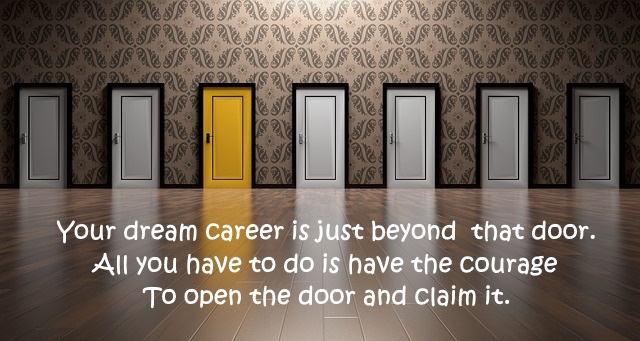Looking Toward the Future? Five Ways to Choose the Right Career Path

Deciding what you want to do with your life and your career is not revolutionary – it is evolutionary. Since you will spend much of your life at work you owe it to yourself to understand what inspires you and motivates you, and match those beliefs with your personality, skill set, interests, and values. Only then will you be able to optimize your prospects for success, fulfillment, and happiness.
Deciding on a career is part art and part science. It is an art because it is personal. It is a science because it is a five-step process requiring assessment, investigation, alignment, career choice, and company choice.
Below are those five steps, which, if taken seriously, I believe will help you choose the career path that is right for you.
Assess
Conducting a self-assessment enhances your ability to identify your interests, skills, personality, and values.
Interests are what you enjoy doing. Skills are what you do best or what you can acquire. Personality is the set of characteristics that determines your behavior. Values are what is important to you.
Ask yourself, “What do I enjoy doing? Where have I excelled?” Conversely, admitting what you do not enjoy strengthens and balances your assessment process.
Analyze your skills and how they fit your interests.
Understanding your personality and choosing a career that fits will improve your prospects for performance and job satisfaction.

Investigate
Investigate and explore your specific areas of interest. Research sources include the web, books, journals, career fairs, and industry professionals. Take career-specific tests as a means to further identify targeted professions. Join various clubs, do volunteer work, or get a summer job.
While in college, research your degree. Look at the careers others have pursued, and talk with graduates to get the pros and cons of the profession. Internships can be valuable firsthand experience, as it is difficult to know if you are going to like something if you have never done it.
Keep an open mind, and don’t hesitate to consider opportunities to explore other options. As you go through this process, don’t be myopic. You may think one way and end up going another.
There are career choices that did not exist a year ago, so don’t be beholden to conventional choices either. Think outside the box and explore multiple options.
Align
Knowing yourself, understanding your strengths and weaknesses, and aligning them with you career choice and work environment make for a win, both for you and the company. Studies have shown that matching a career with your interests and personality results in greater satisfaction and fulfillment. Individuals who are successful, fulfilled, and happy in their careers are motivated and energized when they go to work. They look at their job as a venue to apply their talent and skills and find more meaning and purpose, with less stress and better health.
Alignment also refers to balance. Lack of balance between your personal values and your work environment can lead to a lack of motivation. No matter how good the money, if your work is not meaningful and rewarding, you will lack the motivation and passion necessary to sustain yourself, day in and day out, throughout your career, to weather challenges and adversity, and to achieve great success.
Develop
Develop a career plan together with a communication and networking plan, including short- and long-term goals, with specific actions.
Do not underestimate the importance of the resume. It should differentiate you by conveying those traits that make you a unique candidate for their organization. If you require assistance with your resume, then engage the services of a professional.
Sending out dozens of unsolicited resumes each week via the Internet can give one a false sense of accomplishment; it is not the most effective way to find an opportunity. The most effective method is networking via established contacts, existing professional organizations, and forums for recruitment. LinkedIn is a good example: 87 percent of all employers use LinkedIn as a recruitment tool. Employment agencies are also an option for industry-specific opportunities.
Do not sit back and wait for something to happen. Take the initiative, and do not be afraid to cold call.

Identify
A company’s culture reflects their values, practices, and beliefs. Research to determine if the culture of a company you are looking at is a good fit for you, starting with the company’s website. Look at the mission statement, the section that describes the company, and why it was founded. Review recent articles or press releases. Research social media for employee and customer comments. When looking at some of the comments by employees, former employees, or customers, bear in mind that not everything you read is true. Look at the leadership team, and read their biographies, noting in particular their education, work experience, and background. The leadership team determines the culture in mid-to smaller-size companies.
Lastly, is the company large or small, established or a start-up? There are pros and cons to each one. It comes down to your personality, goals, and what you are looking for in a company. If you are a structured individual, want to focus on a specific area, and value a fairly predictable career path with stability, a large company may be a better match. If you are entrepreneurial and adventurous, consider a smaller company or even a start-up, especially if there is an opportunity for ownership.
It will take a lot of work and research to go through these five steps. But by putting that work in now, you will set yourself up for a happier, more successful and more fulfilling career.
This guest post was authored by Fred Stuvek

FRED STUVEK JR. is the author of Don’t F*** This Up and It Starts With You. He has achieved extraordinary success in diverse realms. He has been inducted into the Pennsylvania Sports Hall of Fame for achievements in football, basketball, baseball, and track. He graduated from the United States Naval Academy, after lettering three years as quarterback for the Midshipmen. After service as a Naval Officer, he transitioned to the business world where he has held senior leadership positions in private and public companies, both domestically and internationally. Key successes include an international medical imaging start-up that led to a successful IPO, and forming a private medical services company, which he subsequently sold. From the playing field, to the war room, to the board room, his leadership and accomplishments have given him a distinct perspective and a results-oriented mindset.

